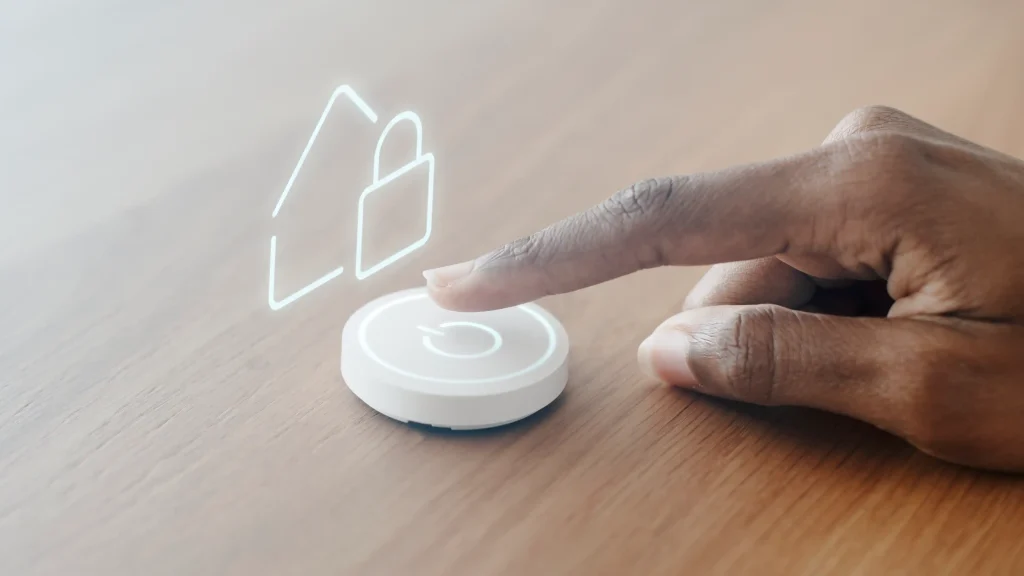Choosing the right smart lock for your home can be confusing. With so many options available, it’s easy to feel overwhelmed. You want security, but you also want convenience. Wi-Fi and Bluetooth smart locks promise both, but which is truly better for your needs?
Think about coming home after a long day with your hands full of groceries. Wouldn’t it be nice to unlock your door with just a tap on your phone? Or picture being on vacation and needing to let a friend in to check on things. A smart lock makes those moments so much easier.
These scenarios highlight the importance of finding the right lock. Security should never feel like a hassle. As you explore your options, consider what fits best with your lifestyle and what makes you feel secure at home. Read on to discover which smart lock might be the perfect solution for your needs.
Key Differences Between Wi-Fi and Bluetooth Smart Locks
Two Minutes Quick Review
| Feature | Wi-Fi Smart Locks | Bluetooth Smart Locks |
| Connection Type | Uses Wi-Fi for remote access | Connects via Bluetooth for local access |
| Control Range | Unlimited range as long as the internet is available | Limited, typically 30-300 feet |
| Installation | May require professional help for some models | Generally easy to install on your own |
| Power Consumption | Higher energy usage, leading to more frequent battery changes | Lower energy use, resulting in longer battery life |
| Remote Access | Yes, control from anywhere | No remote access; usable only when nearby |
| Integration | Easily connects with multiple smart devices | Primarily connects with smartphones |
| Cost | Typically on the higher end | Usually more budget-friendly |
Overview of Wi-Fi smart locks

Wi-Fi smart locks are the best security tools that provide homeowners control and visibility over who can enter and exit their houses. In other words, even when you’re far from home, you can remotely control your Wi-Fi smart locks using an app on your computer, tablet, or smartphone by connecting them to your house’s wi-fi networks.
Key features of Wi-Fi Smart Locks:
Numerous features that improve accessibility, convenience, and security are included with Wi-Fi smart locks. Below is a thorough analysis of the salient features:
Remote Access: With Wi-Fi smart locks, you can control your lock from anywhere using your smartphone. Whether you’re at work or on vacation, locking or unlocking your door is just a tap away.
Notifications: Receive alerts whenever someone unlocks or locks the door. This feature keeps you in the loop about who’s coming and going, adding an extra layer of security.
Smart Home Integration: These locks often work seamlessly with other smart home devices, like Amazon Alexa or Google Assistant. This means you can lock or unlock your door with just your voice.
User Access Management: You can easily grant temporary access to friends, family, or service providers. Create unique codes for different people and decide how long they can use them.
Keypad Entry: Many models offer a keypad entry as a backup option. This means you can enter a code if your smartphone isn’t nearby.
Automatic Locking: Some locks automatically lock after a set time. This feature ensures you don’t forget to secure your home when you leave.
Activity Logs: You can track who entered or exited your home and at what times. This is especially useful for families who want to keep an eye on their kids or for those renting out their homes.
Battery Backup: Many Wi-Fi locks come with a battery backup feature, ensuring you can still access your home even if the power goes out.
Pros
Convenience: Managing access without physical keys is a game changer. No more fumbling around in your bag to find them!
Control from Anywhere: You can lock or unlock your door no matter where you are. This is super handy for emergencies or letting someone in while you’re away.
Monitoring: The activity logs allow you to know who comes and goes. You can relax knowing you have a clear record of all activity.
Integration: These locks connect with other smart devices, allowing routines like automatically locking the door when you leave for work. This adds convenience to your daily routine.
Multiple Users: Easily add or remove users from the system. This flexibility is perfect for families, roommates, or short-term rentals.
Cons
Battery Life: Wi-Fi locks tend to use more power, which means you might be changing batteries more often than you’d like.
Installation Complexity: Some models can be tricky to install or might need a professional’s help. Be prepared for a bit of a learning curve.
Security Risks: If not properly secured, Wi-Fi locks could be vulnerable to hacking. It’s important to ensure your network is safe.
Network Dependence: If your Wi-Fi goes down, you may temporarily lose access to your lock. That can be a hassle.
Cost: Wi-Fi locks generally come with a higher price tag, both for the lock itself and any installation costs.
Overview of Bluetooth Smart Locks
Bluetooth smart locks use Bluetooth technology to connect directly to your smartphone. They work best for people who want secure, local control because their range is typically between 30 and 300 feet. You can quickly access your door without fumbling for keys when you’re nearby.
Key features of Bluetooth Smart Locks
Bluetooth Connectivity: These locks use Bluetooth technology to unlock your door with your smartphone when you’re nearby, usually within about 30 feet.
Easy Setup: Many Bluetooth locks are designed for easy installation. You can often set them up yourself without needing a toolbox or professional help.
Mobile App Control: Manage your lock settings through a dedicated app on your smartphone. This makes it simple to change access codes and monitor usage.
Auto-Lock Feature: Some Bluetooth locks automatically lock the door after a certain period. This helps you avoid leaving your door open accidentally.
Guest Access: Share access with friends or family without handing out physical keys. Create temporary codes that expire after a set time, making it easy to keep things secure.
Low Power Consumption: Bluetooth locks usually consume less power than their Wi-Fi counterparts. This means fewer battery changes and less worry about running out of juice.
Offline Functionality: Since they don’t require an internet connection, you can rely on them even during Wi-Fi outages. You’ll always have access as long as your phone is charged.
Durability: Many Bluetooth locks are built to withstand various weather conditions, making them suitable for outdoor use.
Pros
Energy Efficient: Because they use less power, you’ll find you don’t have to change the batteries as often.
Simplicity: Installing and setting up a Bluetooth lock is usually straightforward. You can typically do it yourself in no time.
Enhanced Security: These locks are less vulnerable to hacking since they don’t rely on the internet. Your phone needs to be nearby to unlock the door, adding a layer of security.
Immediate Access: As you get close to the door, it unlocks quickly. This feature is convenient when your hands are full of groceries.
Cost-Effective: Bluetooth locks are generally cheaper than Wi-Fi locks. If you’re on a budget, they can provide great security without breaking the bank.
Cons
Limited Range: You need to be within a certain distance to unlock the door, which can be inconvenient if you forget your phone.
Dependence on Phone: If your phone dies or you leave it at home, you won’t be able to access your house. That can create a real headache.
Fewer Features: Bluetooth locks might not have all the advanced features found in Wi-Fi models. If you’re looking for extensive control, this could be a downside.
No Remote Access: You can’t lock or unlock your door from afar, which may not work for everyone’s lifestyle.
User Management: Managing guest access can be less flexible compared to Wi-Fi models, requiring you to reprogram codes for temporary access.
Which Smart Lock is Right for You?

This is the question only you can answer best. Yes, you read that right!
If you find yourself traveling a lot or just want to keep tabs on your home from a distance, a Wi-Fi smart lock could be a perfect choice. It allows you to check in and control your door from anywhere, giving you peace of mind.
On the other hand, if you appreciate simplicity and prefer a lock that doesn’t rely on constant internet access, a Bluetooth smart lock might be just the ticket. These locks are generally easier to install, and their lower energy needs mean you won’t have to worry about frequent battery changes. It’s all about what fits best into your daily routine and makes life a little easier.
Top Wi-Fi Smart Locks to Consider
- August Wi-Fi Smart Lock: Known for its easy retrofit installation, this lock integrates well with other smart home devices and has a strong reputation for security.
- Schlage Encode: With built-in Wi-Fi, you don’t need any extra hubs to use it. This lock offers solid security features and is user-friendly.
Top Bluetooth Smart Locks to Consider
- Yale Assure Lock 2: This lock combines Bluetooth with a keypad, giving you multiple ways to access your home. Plus, the app is straightforward and easy to navigate.
- Level Lock: This unique option fits over your existing deadbolt, allowing you to keep your current keys while still offering smart features. Moreover, it has a sleek design that blends well with traditional hardware, making it an attractive choice .
Conclusion
When it comes to smart locks, the choice between Wi-Fi and Bluetooth often reflects your lifestyle and preferences. If you value the ability to check on your home from anywhere, a Wi-Fi lock might be your best bet. It offers convenience and can integrate beautifully with your existing smart home devices.
On the other hand, if you’re looking for a simple solution that works well without needing constant internet access, a Bluetooth smart lock could be just what you need. It’s all about finding what fits seamlessly into your daily routine and gives you peace of mind. Whatever you choose, smart locks can make securing your home easier and more reliable.
FAQs
- Can I install a smart lock myself?
Most smart locks are designed for easy installation. Many people find that they can handle Bluetooth models on their own, while some Wi-Fi locks might be a bit trickier and could benefit from professional help.
- Do smart locks work during a power outage?
Generally, Bluetooth smart locks will still work since they don’t rely on a power source. Wi-Fi locks may need backup batteries to function during an outage, so that’s something to keep in mind.
- Are smart locks compatible with existing deadbolts?
The good news is that many smart locks are made to retrofit over your existing deadbolts. This makes it simple to upgrade your security without replacing the whole locking system.
- How secure are smart locks?
Smart locks, whether Wi-Fi or Bluetooth, usually come with encryption and various security features. It’s always a smart idea to pick well-reviewed brands and keep your software updated to ensure everything stays safe.
